Hyvä Theme is Now Open Source: What This Means for Magento Community - Mageplaza
Hyvä is now Open Source and free. Discover what changed, what remains commercial, how it impacts the Magento ecosystem, and how to maximize its full potential.

You might hear somewhere that, “Data is the best friend for every marketer.”
Without data, marketers find it difficult to know what is working well for their campaigns, diagnose potential problems, and determine the areas to focus their efforts on.
Knowing the metrics to monitor can mark the difference between success and failure. Marketers can have access to dozens, if not hundreds, of marketing analytics tools. All of these tools promise you the ability to process your data and extract insights from it.
However, which ones are worth your consideration?
To help you find the missing piece, we’ve rounded up 12+ of the top marketing analytics tools available today and categorized them to simplify your search.
Let’s get started right now!
A marketing analytics tool is a software platform that helps marketers understand the health of their marketing campaigns. It may track the number of key metrics, including web traffic, page views, click-through rates, or many more, to inform a marketer of which efforts are working, which aren’t, and why.
Some marketing analytics tools may focus on individual marketing channels, such as social media, email, display, or search advertising, while others may holistically analyze all your marketing data. The need for various types of marketing analytics tools varies by marketing strategy and company.
Marketing analytics tools are vital for numerous reasons, but two are central to a marketer’s responsibilities:
Addressing both optimal campaign creation and precise marketing attribution is imperative.
They help customize your marketing analytics to the target audience
Utilizing marketing analytics tools enables marketers to forecast customer responsiveness to specific offers based on their behavior within defined segments.
For instance, by employing a digital marketing analytics tool, a marketer can compare the effectiveness of two ads promoting the same offer but featuring different headlines and calls to action. This tool allows the marketer to track audience responsiveness, analyze respondent behavior, and identify the platforms generating the most traction.
Armed with such insights, marketers can tailor future campaigns precisely to match customer preferences and deliver them at optimal times and locations, also leveraging tools for personalized content recommendations.
They facilitate tracking and analyzing marketing performance across multiple channels
Marketers employ multiple channels to engage customers, spanning online platforms like social media ads and search engines, as well as offline avenues such as print and television. However, pinpointing customer responses across these channels, especially offline ones, poses a challenge. Similarly, determining if and when a customer engages with both online and offline channels adds complexity.
Managing numerous online and offline channels is crucial for marketers to connect with potential customers. A marketing analytics tool consolidates customer data, revealing when a particular customer responds to any channel.
With this integrated view, marketers can swiftly generate reports for each channel and share them with stakeholders. This unified perspective allows marketers to identify the most and least effective channels, aiding in accurate management of marketing budgets and resources.
Depending on its marketing strategy and objectives, a company may require various marketing analytics tools. While these tools encompass a wide array of categories, three types stand out as essential for any organization, regardless of industry, target audience, or marketing goals:
Web analytics tools serve as invaluable resources for marketers, enabling the tracking, measurement, and reporting of website activity. They provide insights into various metrics such as website traffic, user engagement duration, referral sources, and more, effectively structuring data to offer a comprehensive view of website performance.
These tools facilitate the comparison of metrics over different time periods, allowing marketers to assess changes in user behavior, such as the variance between new and returning website visitors across quarters.
Moreover, web analytics tools offer insights into the sources driving website traffic, whether from social media platforms, search engines, or referrals. They also highlight which pages attract the most attention from visitors, the duration of their stay, and exit points. The convenience of accessing this data with just a few clicks streamlines the process of gathering insights, eliminating the need for manual data collection.
For businesses investing in search engine optimization (SEO), web analytics tools are indispensable for tracking and analyzing the effectiveness of SEO efforts.
For instance, identifying that visitors arriving from a Google search show prolonged interest in a specific blog post signals their interest in the topic. Armed with this insight, marketers can develop additional content on the same subject and interlink related posts, facilitating deeper exploration by website visitors.
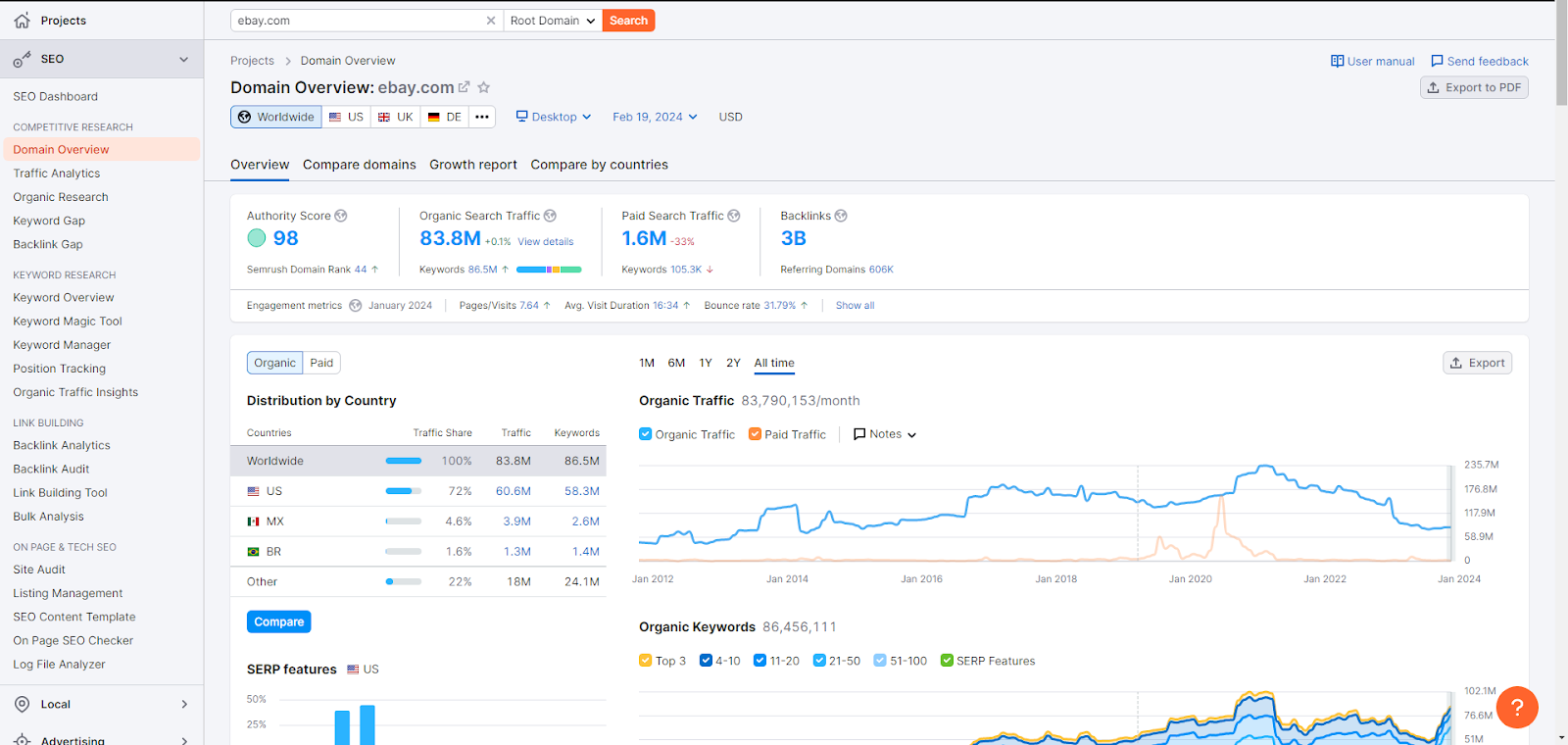
Social media analytics tools empower marketers to gather data from various social media platforms and leverage it to optimize their social media marketing endeavors. Unlike the basic metrics like “retweets” and “likes” provided by social media platforms, these tools offer in-depth insights by monitoring conversations related to your brand, product, industry, and competitors.
By configuring the tool to notify you whenever your brand is mentioned, you can seize growth opportunities or address potential crises promptly. Some advanced tools utilize artificial intelligence (AI) to discern the underlying emotions in social conversations, distinguishing between positive and negative sentiments.
Furthermore, social media analytics tools enable you to scrutinize your competitors’ social media strategies, gauging consumer reactions to their marketing efforts and engagement with their products or services. Given that you share a target audience with your competitors, analyzing their activities provides valuable insights into effective strategies and areas for improvement in your own campaigns.
Email marketing analytics tools enable the monitoring of subscriber interactions with your emails. They facilitate tracking metrics such as open rates, reader engagement, and immediate closures. These tools offer valuable data and insights to inform marketers in crafting and optimizing email marketing campaigns for improved outcomes.
Marketers can analyze factors such as the effectiveness of subject lines, the types of emails driving traffic to their website or product, and those leading to conversions
Google Analytics is a free service offered by Google that helps website owners understand how people are interacting with their website. It provides detailed statistics on things like website traffic, user demographics, and user behavior. This information can be used to improve the website’s design, content, and marketing strategy.
It’s free and is utilized by over 30 million websites, as reported by BuiltWith.
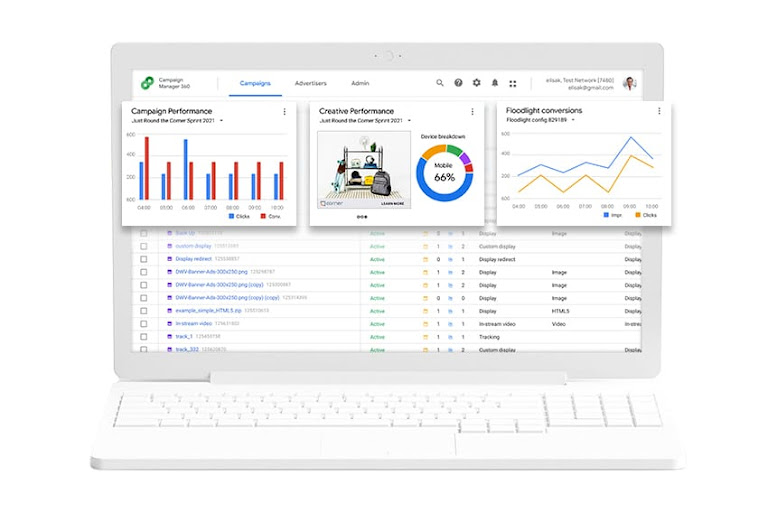
Key features of Google Analytics:
Pros:
Cons:
Pricing: FREE
If you are using the Magento 2 platform, this article may be helpful for you: Add Google Analytics to Magento 2.
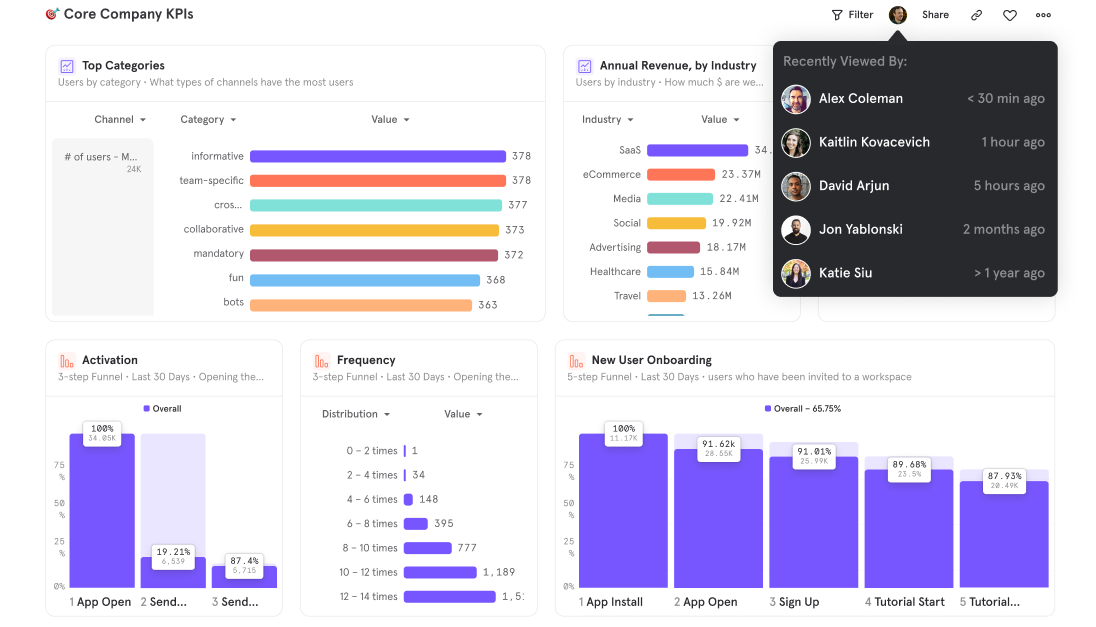
Mixpanel is a tool aimed at tracking user events on websites and mobile apps, catering to iOS and Android platforms. It provides insights into user actions, trends, counts, and sequences of events once events are added to its platform.
Users need to specify the actions they want to track, which can be done through code annotations or a visual selector. The chosen events are then displayed on the dashboard, along with selected metrics. While primarily targeted at product managers, Mixpanel is also utilized by marketing teams to analyze user behavior and enhance funnel optimization.
Key features of Mixpanel:
Pros:
Cons:
Pricing:
Check the details here.
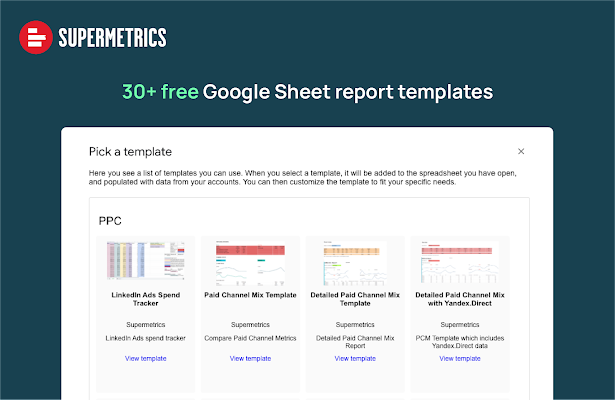
Supermetrics is a top analytics tool for eCommerce brands, consolidating data from various sources into Google Data Studio. With connectivity to over 70 marketing and sales platforms, it enables the creation of interactive dashboards that integrate diverse datasets.
Supermetrics allows businesses to consolidate data from various marketing and sales platforms like Facebook Ads, Google Analytics, and Instagram into their preferred reporting, analytics, or storage platform. This could be a business intelligence tool, spreadsheet, data visualization tool, data lake, or data warehouse.
The outcome is enhanced insights into marketing data, significant time and cost savings by eliminating manual copy/paste tasks, and better marketing performance driven by data-informed decisions. Supermetrics empowers marketers, analysts, and engineers to focus more on utilizing data and less on data movement.
Key features of Supermetrics
Metrics:
Reporting:
Administration:
Marketing Operations:
Pros:
Cons:
Pricing:
Check more details here!
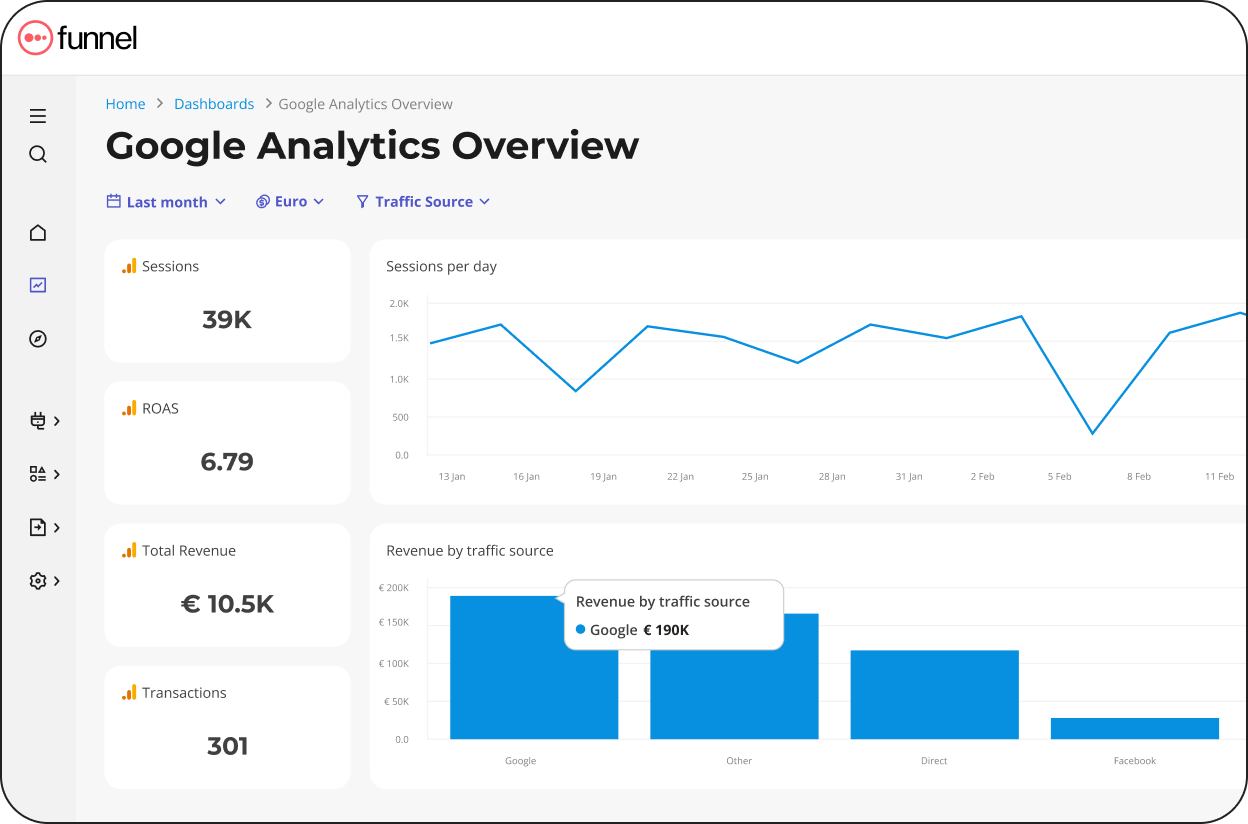
Funnel provides marketers with a seamless way to gather, organize, and share data from various marketing platforms, all without the need for coding. Acting as a central hub for marketing data, it ensures accuracy and consistency across your performance metrics. With just a few clicks, Funnel can collect data from over 500 marketing and sales platforms, offering a fast, reliable, and maintenance-free solution that easily scales across teams, regions, or brands.
By offering a centralized repository for all original and custom data fields, Funnel ensures that your data meets the highest standards for governance, security, and control. Your data is continuously updated, complete, and accurate, making it readily available for reporting and analysis. With both prebuilt and customizable rules, you can effortlessly prepare your data for analysis while maintaining the integrity of the underlying data. This grants you unparalleled flexibility in your analytical endeavors, empowering you to drive impactful insights effortlessly.
Key features of Funnel:
Unified Data Collection: Funnel serves as a central hub for collecting data from over 500 marketing and sales platforms, simplifying the data aggregation process.
Code-Free Integration: Users can connect data from any marketing platform without writing a single line of code, streamlining the integration process.
Data Transformation: Funnel offers prebuilt and customizable rules for data transformation, allowing users to prepare data for analysis effortlessly.
Custom Data Fields: Users can create custom fields to tailor data collection to their specific needs, ensuring flexibility in data organization.
Governance and Security: Funnel adheres to the highest standards for governance, security, and control, ensuring data integrity and compliance with regulations.
Scalability: The platform provides a fast, reliable, and maintenance-free solution that can easily scale across teams, regions, or brands.
Data Accuracy: Funnel ensures that data is always up to date, complete, and accurate, providing users with reliable information for reporting and analysis.
Pros:
Cons:
Pricing:
In summary, Heap is a product analytics platform designed for customer success teams, marketers, and product managers. It enables tracking of user interactions across all touchpoints in user journeys.
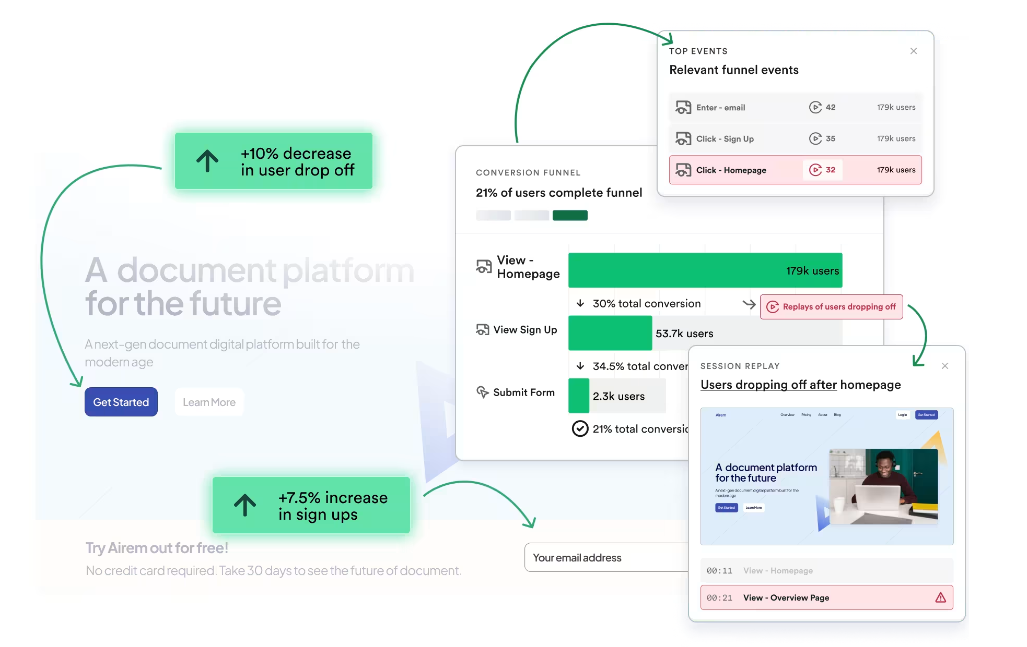
By leveraging this data, product teams can develop a deeper understanding of user needs and make informed, data-driven decisions to enhance conversions, retention, and overall customer satisfaction.
Heap facilitates the collection, analysis, and visualization of comprehensive data on all aspects of the product’s user experience.
Key features of Heap Analytics:
Autocapture: Heap effortlessly records every click, pageview, form fill, session replay, and user journey on your website or product without any manual effort.
Lookback analysis: Enjoy the freedom to explore past behaviors without the need for pre-planning questions. Heap allows you to roll back time and retrieve missing behaviors retroactively.
Easy-to-use, automated insights: Access detailed insights and ready-made charts without the hassle of manual configuration or specialized training. Whether you have a specific question or need general insights, Heap is designed to provide answers effortless
Pros:
An extensive array of analytics and reporting tools providing insights into various aspects of user behavior.
Automatic data capture eliminates the need for tagging, allowing for retrospective analysis as required.
Real-time data tracking enables immediate responses and event-triggered experiences.
Support for both web and mobile products ensures versatility across different platforms.
Cons:
The learning curve for Heap can be steep due to its advanced features, making it challenging to master.
Heap incurs high data storage costs since all collected data must be stored, regardless of its immediate necessity.
Pricing
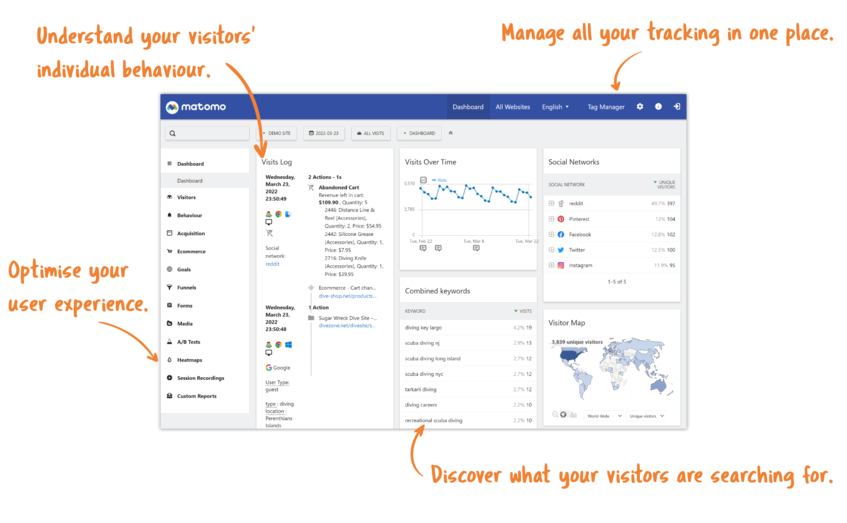
Matomo is a web analytics platform that’s open-source and used by over 1.4 million websites across more than 190 countries. It’s available in over 50 languages and prioritizes privacy protection, 100% data ownership, and no data sampling.
There are two hosting options available: Cloud and On-Premise. Cloud hosting streamlines installation, while On-Premise offers a free, open-source, self-hosted PHP/MySQL software that can be installed on your server for maximum flexibility.
This premium tool for web analytics and conversion optimization offers a comprehensive set of features, including heatmaps, session recordings, goals, form analytics, ecommerce tracking, and funnels, to provide you with detailed insights.
Matomo delivers real-time updates on visitor details, tracks goal conversions for business objectives, offers event tracking to measure user interaction on your website, and facilitates A/B testing for optimizing website campaigns through experimentation and A/B tests.
Key features of Matomo:
Pros:
Cons:
Pricing: Based on your monthly traffic
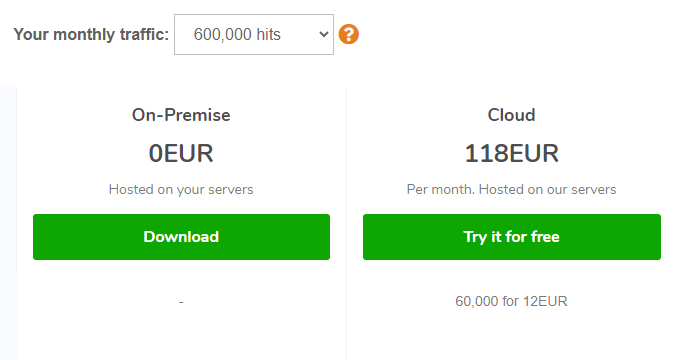
Check the price here!
Metabase is a business intelligence tool that focuses on self-service analytics and creating dashboards. It offers a free open-source tier and paid plans, making it accessible for businesses of all sizes. Users can connect to various data sources and query their data without writing SQL, making it easy for technical and non-technical users. Metabase is known for its ease of use and intuitive interface.
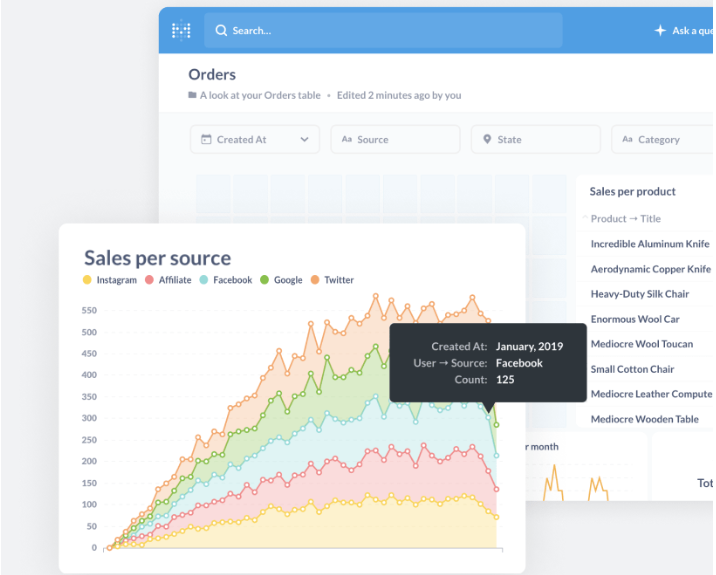
Key features of Metabase:
Pros:
Cons:
Pricing:
Enterprise: Custom pricing
Semrush is a leading SaaS platform for online visibility management. It empowers businesses worldwide to execute SEO, PPC, content, social media, and competitive research campaigns, yielding measurable online marketing results. Semrush provides insights and solutions for companies to strategize, execute, and evaluate campaigns across diverse marketing channels. It boasts over 87,000 paying customers.
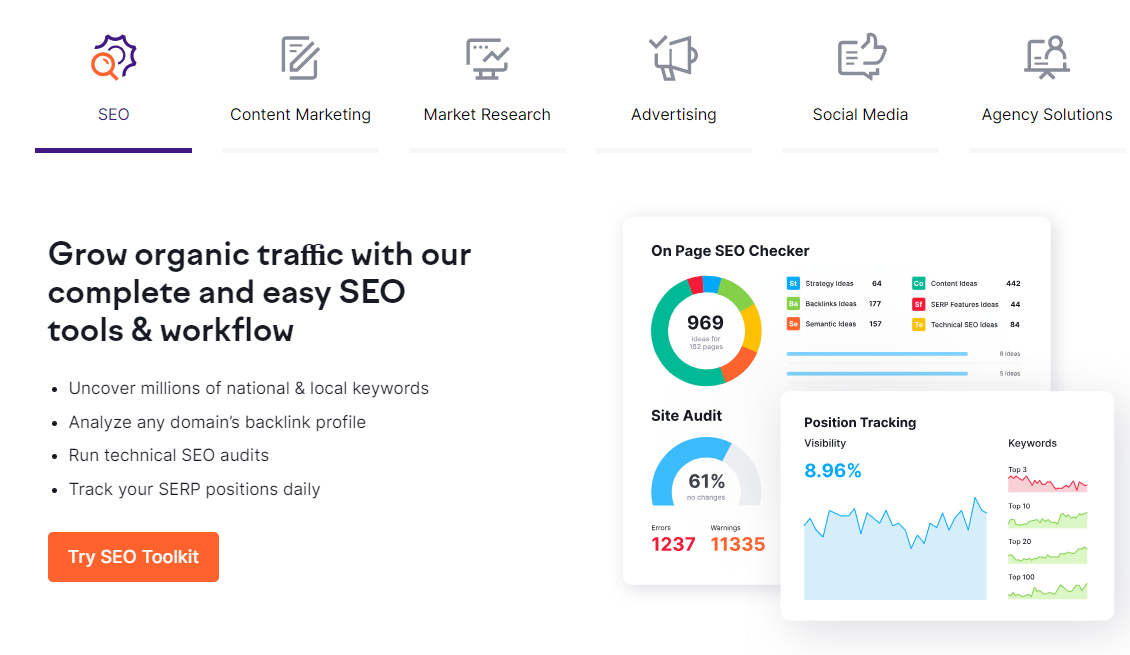
Semrush’s Statistics:
Key features of Semrush:
Pros:
Cons:
Pricing:
Established in 2013, Buzzsumo has evolved into a comprehensive content marketing tool, providing extensive content research and performance insights.

With Buzzsumo, you can access a wide range of data from platforms like Facebook, Twitter, and Pinterest, along with trending news stories and alerts, all in one place. It boasts the world’s largest engagement data index, with over 300 trillion engagements, 8 billion articles, and millions of new articles indexed daily.
Buzzsumo features a content analyzer that identifies top-performing content on any topic, aiding in the creation of similarly high-performing content for your website. It’s an essential tool for refining your marketing strategies.
Key features of Buzzsumo:
Content Discovery: Explore topics, trends, and forums to spark content ideas. BuzzSumo keeps you updated on both trending and emerging topics.
Content Research: Analyze billions of articles and social media posts to uncover valuable insights.
Find Influencers: Discover influential authors and creators with engaged audiences and authentic authority across Instagram, Twitter, and the web.
Monitoring: Keep tabs on your competitors, brand mentions, and industry updates. Alerts ensure you stay informed about important events and avoid being overwhelmed by the constant flow of social media content.
BuzzSumo API: Seamlessly integrate, automate, and develop with the robust BuzzSumo API for enhanced functionality.
Pros:
Cons:
Pricing:

HubSpot is a cloud-based CRM platform designed to assist companies of all sizes in tracking leads, nurturing relationships, and analyzing business metrics. It caters to various industries including retail, real estate, marketing, and accounting, serving both B2B and B2C needs.
By consolidating functionalities, HubSpot eliminates the necessity for additional tools such as CRMs, autoresponders, form builders, and even WordPress.
With HubSpot, you can effectively monitor both inbound and outbound leads while managing your entire sales pipeline.
Key features of Hubspot:
Pros:
Cons:
Template Customization Difficulty: Users without expertise in CSS or related skill sets may struggle to customize templates effectively.
Split Testing Limited to Higher Packages: HubSpot restricts access to split testing features to higher-tiered packages, which could be restrictive for users on tighter budgets.
Pricing:
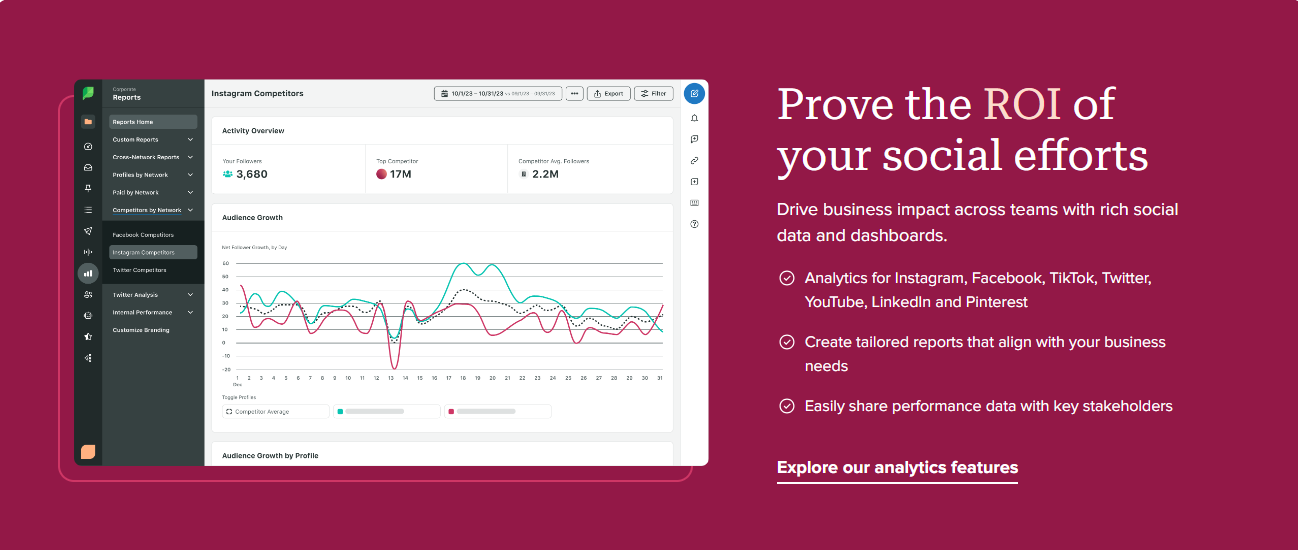
Sprout Social simplifies social media management by combining content scheduling, audience engagement, and performance analysis into one user-friendly platform. It allows seamless switching between Facebook and Twitter, with easy tagging and interaction features.
The intuitive interface and robust reporting tools make social media posting easier, providing comprehensive insights into post performance across channels. Additionally, Sprout Social offers flexible posting times and can handle scheduling for an entire month with minimal team involvement. It’s an ideal tool for businesses with internal marketing teams looking to efficiently manage their social media presence.
Key features of Sprout Social:
Pros:
Cons
Pricing:

Adverity is a marketing analytics platform designed to streamline data integration, transformation, and visualization. It is tailored for marketers who need to aggregate data from multiple sources and generate comprehensive reports and insights efficiently.
Key features of Adverity:
Pros
Cons
Pricing
Each of these above tools has its strengths. It is up to you to choose the right marketing analytics tools for your needs and make the right data-driven decision to assist you with your marketing efforts.
We want to hear more from you. What is your biggest challenge in choosing between marketing analytics tools? Any features you are still itching for? Data points you have trouble tracking? Let us know, and we’ll discuss it together.
Related Posts:
